Niklas Golitschek works as a freelance journalist for different media in Germany, including Witness Europe and on the ground.info. Furthermore he started own media company three years ago.
In 2019 he visited Ukraine for the first time – to cover the war in Donbas for the German internal audience. Since the beginning of the full-scale Russian invasion Niklas has visited Ukraine three times. In collaboration with Ukrainian colleague Sergey Panashchuk from Odessa he documents voices of Ukrainian people on the ground.
“Big media focus on big stories like about Bakhmut or Kherson. But stories of ordinary people, who are suffering from the war, are also important” describes the aim of their collaboration Sergey.
During the last visit Niklas Golitschek was studying an economic situation within Ukrainian journalism under war conditions. He communicated with the National Union of Journalists of Ukraine recent data for his topic and told about his work in Ukraine.
“In 2019 I had a feeling the war in Donbas region was not present enough in Germany, and we should talk more regularly about this and how it’s affecting people there. Then I focused more on other topics… But in November 2021 I started again because this is an important topic. [I thought] maybe we should get voices on the ground to see how Ukrainians feel about the threat. Because a lot of the discussion was always like what Putin says, what Biden says… But you barely had voices from Ukrainian people. And that’s why in January 2022, just three weeks before the full-scale invasion began, my colleague Sergey and I traveled to Dnipro, Kharkiv, Kherson, Popasna, Vovchansk and other cities just to ask people how do you feel about…”
While the full-scale invasion started Niklas reported about the situation on the Polish–Ukrainian border for a German newspaper.
“…Because I’ve been here a few weeks before, a German newspaper asked me to drive to the Polish-Ukrainian border to cover the situation about Ukrainian refugees leaving the country and to get impressions from there”.
Next time he came back to Ukraine in May.
“I traveled to Dnipro, Kharkiv and Kyiv. The end of August, I traveled to Kiev again and Odessa. Now this is the third time since the invasion that I’m in Ukraine”.
For his information Niklas focuses primarily on civil organizations and civil people, sometimes also on military people, and not necessarily relies on governmental institutions.
“A lot of just about portraying people – to give the readers in Germany an impression about what everyday life looks like, for example, a restaurant owner in Kharkiv… What did they experience the last 12 months? How do they feel today? What are their struggles? What are their hopes?”
Sometimes he has to communicate with the institutions, admits the German journalist. “For example, in Kharkiv we visited the Rocket Cemetery, so of course we talked to a spokesperson of the prosecutor’s Office”.
“The collaboration between Niklas and me is interesting because we have different mentalities, different professional approaches…” adds Sergey. “And that is helpful because we are interconnected and we can understand more different ways of work, other ways of thinking… When foreign journalists come here with their mentality and their way of work, they might not fully understand what is really happening here. They get distorted information or distorted views. So they might not express it in the correct form to Europe”.
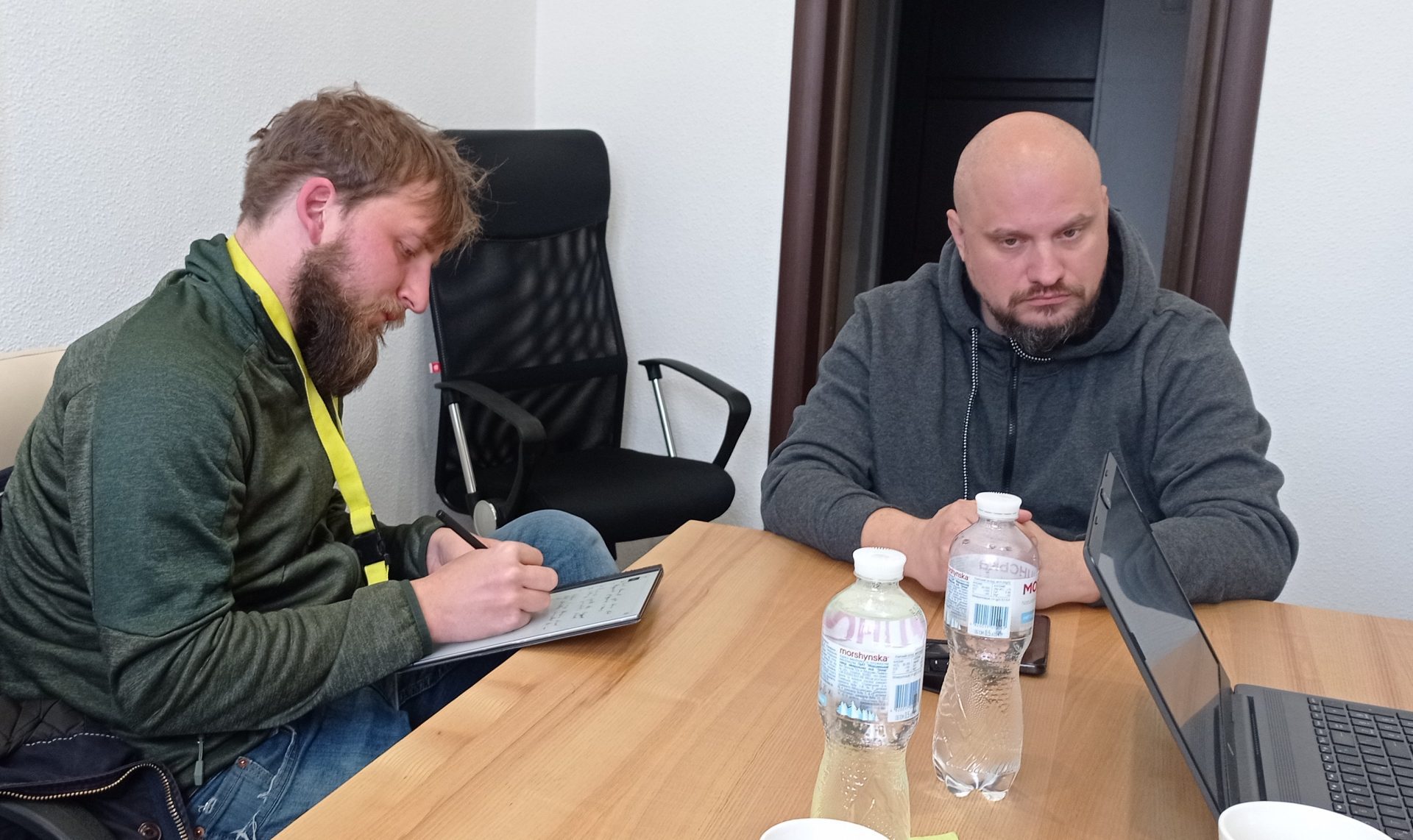 Niklas further explains the general situation in collaborations between Ukrainian and foreign media.
Niklas further explains the general situation in collaborations between Ukrainian and foreign media.
“From my side Ukrainian journalists need to look for governmental fundings and foreign grants… It was a bit strange for me that not so many collaborations between Ukrainian and foreign media started… It’s not like Ukrainians could not speak English or another foreign language. And also abroad you have people who are able to speak Ukrainian, so there would be possibilities to make closer ties. But somehow it didn’t happen. And I know, for example, German TV in the first days of the invasion was not even able to produce its own content, but only had to rely on what’s available to them”.
He doesn’t know the exact number of German journalists in the Ukraine at the moment. But he believes It’s increased by the time.
“I think some media are doing a really good job nowadays. In May, when I was here for the first time after the invasion, what we saw in Germany was the death, the destruction, the suffering. So the debate in Germany was a lot about why are they doing this and not just finding some compromise? Why do they fight for this to get everything destroyed? And when I came here, of course, I saw the destruction in Kharkiv and in other places. But I could also see why Ukrainians were fighting so that destruction did not happen in Kiev or in Lviv. And yes, I could see a whole new perspective from here. And I think it’s very important to share it”.
Niklas occasionally reads Ukrainian media with Google Translate or, for example, Kiev Independent “because it has an English website”. He follows some of the Telegram-channels of different media as well.
“I think the Germans care the most about whether there will be no further escalation like a nuclear war or NATO is not being drawn into the war. Then it’s a lot about the economic aspects, which is not only impacting Ukraine but also the international community… I think it’s especially important to deliver positive stories as well. Let they be from volunteers or about the Ukrainian hope, the Ukrainian spirit faces. It’s what we are trying to do – to show this war is not only about suffering and death, but also about freedom and optimism. And I think especially in Germany people either see the old granny from Bakhmut in her basement or Zelenskiy walking somewhere, but they don’t see what’s in between – the ordinary faces”.

 THE NATIONAL UNION OF
JOURNALISTS OF UKRAINE
THE NATIONAL UNION OF
JOURNALISTS OF UKRAINE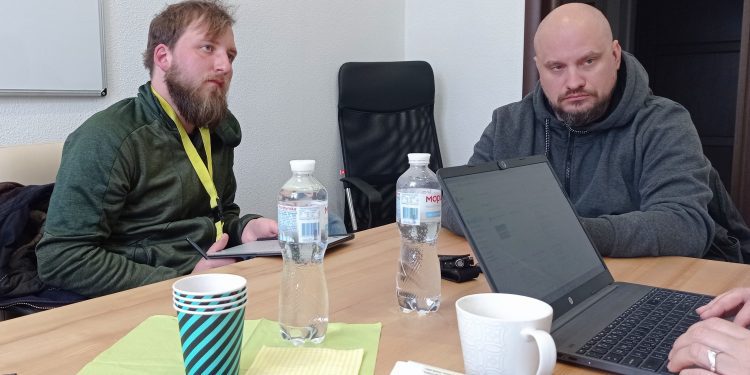
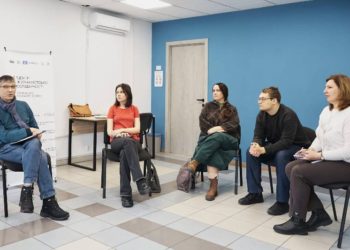
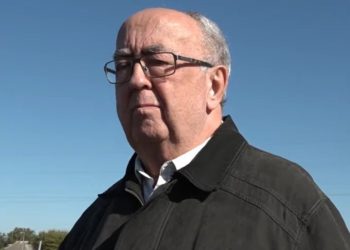
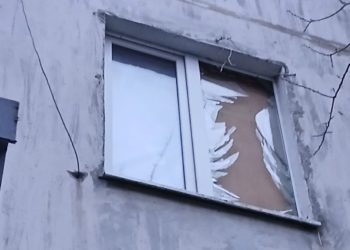













Discussion about this post